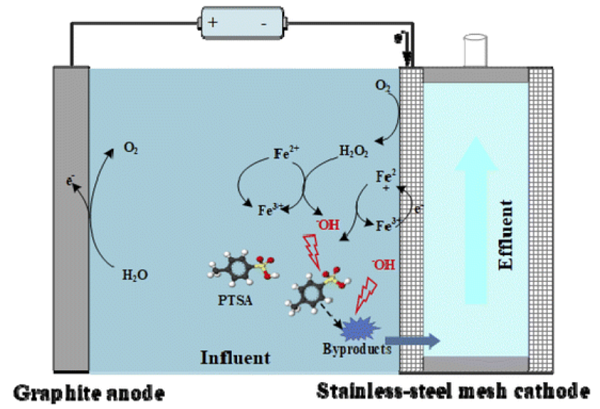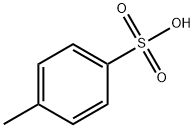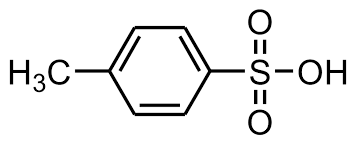How can the organic pollutant PTSA be removed from wastewater?
Introduction
p-Toluenesulfonic acid (PTSA), also known as a tosylate or para-toluene sulfonate, is a member of the class of compounds known as p-methyl benzenesulfonate. p-Methylbenzenesulfonates are benzene sulfonic acids (or derivatives thereof) carrying a methyl group at the para-position. It is slightly soluble (in water) and an extremely strong acidic compound (based on its pKa). It is a white solid soluble in water, alcohol, and other polar organic solvents.
Synthesis method
PTSA is prepared on an industrial scale by the sulfonation of toluene. Common impurities include benzenesulfonic acid and sulfuric acid. PTSA monohydrate contains an amount of water. The Karl Fischer method is used to estimate the total moisture present as an impurity. Impurities can be removed by recrystallization from its concentrated aqueous solution, followed by azeotropic drying with toluene.
PTSA is found to be used in organic synthesis as an "organic-soluble" strong acid. Examples of uses include:
Acetalization of an aldehyde.
Fischer–Speier esterification
Transesterification reactions.
Aerosil 200 has been modified using methoxysilanes in toluene reflux, with p-toluenesulfonic acid as the catalyst[1].
Removal mothed
p-Toluenesulfonic acid (PTSA), a kind of aromatic sulfonate that belongs to the refractory organic pollutant, is one of the most widely used chemicals in the pharmaceutical, dye, petrochemical and plastic industries. PTSA is an organic strong acid with a high corrosion ability. In addition, it has biological toxicity and non-biodegradability due to the existence of a sulfonic acid functional group directly connected to the aromatic ring. Therefore, developing effective technologies to remove the refractory organic pollutant PTSA from wastewater is imperative.

In 2022, Wang et al. developed a filtration-enhanced electro-Fenton (FEEF) reactor, with an SSM filtration module as the cathode and graphite plate as the anode, to achieve efficient removal of the PTSA. Under the optimal operating conditions of applied voltage 2.5 V, pH = 3.0, the addition of 0.2 mM Fe2+ and 1.0 mM H2O2 for 120 min, the removal efficiency of PTSA (initial concentration of 100 mg L−1) reached 92.6%. Compared with anodic oxidation, conventional Fenton system and reported photo-Fenton system, the FEEF system showed higher ˙OH yield and PTSA removal efficiency, with a lower effluent biological toxicity and operating cost. The enhanced mass transfer rate by the filtration in the FEEF system accelerated the regeneration of catalyst Fe2+ and further promoted the heterogeneous reactions. The Fe species on the surface of the FESSM cathode possessed a gradient distribution; the inner layer was dominated by Fe, and the outer layer was Fe(iii). The degradation pathways of PTSA were proposed, including methyl hydroxylation, sulfonyl hydroxylation, β-hydrogen hydroxylation, and ring-opening reaction. These results demonstrate that the novel FEEF system is promising for removing refractory organic pollutants from industrial wastewater. However, the stability and feasibility of the FEEF system in actual wastewater containing refractory organic pollutants need to be further investigated in the future[2].
[1] Nuria García. “Use of p-Toluenesulfonic Acid for the Controlled Grafting of Alkoxysilanes onto Silanol Containing Surfaces: Preparation of Tunable Hydrophilic, Hydrophobic, and Super-Hydrophobic Silica.” Journal of the American Chemical Society 129 16 (2007): 5052–5060.
[2] Wang, Xueye et al. “Removal of p-toluenesulfonic acid from wastewater using a filtration-enhanced electro-Fenton reactor†.” RSC Advances 39 (2022): 25424–25432.
References:
[1] NURIA GARCíA. Use of p-Toluenesulfonic Acid for the Controlled Grafting of Alkoxysilanes onto Silanol Containing Surfaces: Preparation of Tunable Hydrophilic, Hydrophobic, and Super-Hydrophobic Silica[J]. Journal of the American Chemical Society, 2007, 129 16: 4858-5298. DOI:10.1021/ja067987a.[2] WANG X, REN L, ZHA W, et al. Removal of p-toluenesulfonic acid from wastewater using a filtration-enhanced electro-Fenton reactor?[J]. RSC Advances, 2022, 39: Page 25118 to 25821. DOI:10.1039/D2RA04921J.
You may like
Related articles And Qustion
See also
Lastest Price from p-Toluenesulfonic acid manufacturers

US $5.00-0.50/KG2025-05-08
- CAS:
- 104-15-4
- Min. Order:
- 1KG
- Purity:
- 99% hplc
- Supply Ability:
- 500TONS
US $100.00/kg2025-04-21
- CAS:
- 104-15-4
- Min. Order:
- 1kg
- Purity:
- 99%
- Supply Ability:
- 100ton



